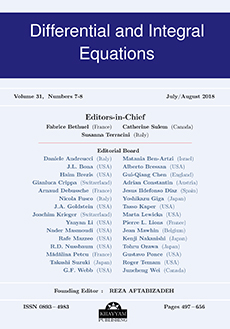Abstract
This article is concerned with travelling-wave solutions of the nonlinear reaction-\newline convection-diffusion equation $$ u_t=(a(u))_{xx}+(b(u))_x+c(u) $$ in which subscripts denote partial differentiation. The coefficients $a$, $b$ and $c$ are supposed to be defined in some closed real interval with infimum 0 and supremum $\ell,0<\ell\leq \infty$. The search is for nontrivial travelling-wave solutions of the form $u(x,t)=f(x-\lambda t)$ where $\lambda$ denotes the wave speed. Specifically, solutions of this type, where $f$ is defined and nonincreasing on $(0,\infty)$ with $f(\xi)\rightarrow 0$ as $\xi \rightarrow \infty$, and where $f$ is defined and nonincreasing on $(-\infty,\infty)$ with $f(\xi)\rightarrow 0$ as $\xi\rightarrow\infty$ and $f(\xi)\rightarrow\ell$ as $\xi\rightarrow-\infty$, are sought. Under mild continuity assumptions on the coefficients $a$, $b$ and $c$ it is shown that the existence of such a travelling wave is equivalent to the existence of a solution of a singular nonlinear integral equation. A number of applications of this result are discussed. In particular the correspondence between the travelling waves and the integral equation is used to resolve an open question in the theory of finite speed of propagation for the reaction-convection-diffusion equation
Citation
B. H. Gilding. "The correspondence between travelling-wave solutions of a nonlinear reaction-convection-diffusion equation and an integral equation." Differential Integral Equations 9 (5) 919 - 947, 1996. https://doi.org/10.57262/die/1367871524
Information





